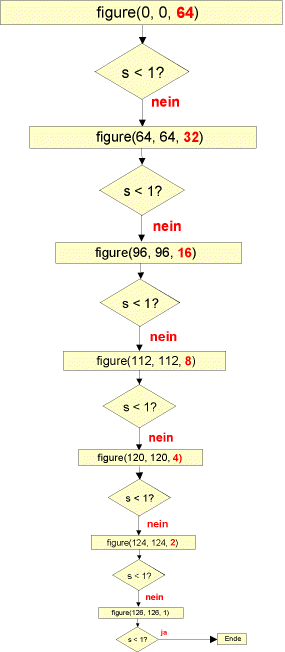Turtlegraphics with Java |
Recursion is a problem solving method in which a problem reduced to the same, but a bit simpler problem. In Java a method is recursive if its declaration class the same method. To be sure that the recursive program does not end in an infinite loop, it is necessary to set breaking conditions.
| // Quadratmuster1.java import ch.aplu.turtle.*; public class Quadratmuster1 extends Turtle { public Quadratmuster1() { hideTurtle(); figure(0, 0, 64); } void figure(double x, double y, double s) { if (s < 1) { return; } else { setPos(x - s/2, y - s/2); quadrat(s); figure(x + s, y + s, s/2); } } void quadrat(double s) { for(int i = 0; i < 4; i++) { forward(s); right(90); } } public static void main(String[] args) { new Quadratmuster1(); } } |
 |
With some small addition other patterns can be drawn...
| // Quadratmuster2.java import ch.aplu.turtle.*; public class Quadratmuster2 extends Turtle { public Quadratmuster2() { hideTurtle(); speed(-1); figure(0, 0, 64); } void figure(double x, double y, int s) { if (s < 1) { return; } setPos(x - s/2, y - s/2); quadrat(s); figure(x + s, y + s, s/2); figure(x - s, y + s, s/2); } void quadrat(int s) { for(int i = 0; i < 4; i++) { forward(s); right(90); } } public static void main(String[] args) { new Quadratmuster2(); } } |
Example Koch graph:
| // Koch.java import ch.aplu.turtle.*; public class Koch extends Turtle { public Koch() { double length = 200; int generations = 4; hideTurtle(); setPos( -180, 0); right(90); koch(length, generations); } private void koch(double s, int n) { if (n == 0) { forward(s); return; } koch(s / 3, n - 1); left(45); koch(s / 3, n - 1); right(90); koch(s / 3, n - 1); left(45); koch(s / 3, n - 1); } public static void main(String[] args) { new Koch(); } } |